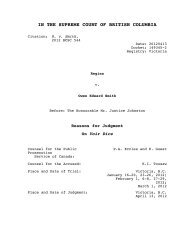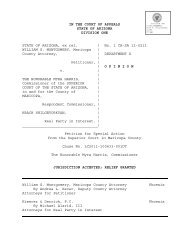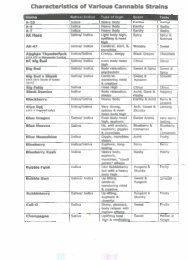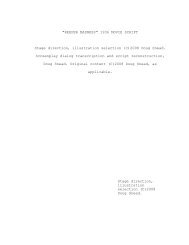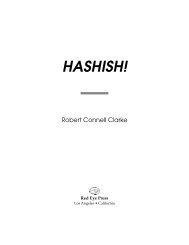3. Umbruch 4.4..2005 - Online Pot
3. Umbruch 4.4..2005 - Online Pot
3. Umbruch 4.4..2005 - Online Pot
You also want an ePaper? Increase the reach of your titles
YUMPU automatically turns print PDFs into web optimized ePapers that Google loves.
48 R.G. Pertwee<br />
ed that, in contrast to CBD, it produces many of its effects by acting on<br />
cannabinoid CB 1 receptors to modulate central and peripheral neurotransmission<br />
and on cannabinoid CB 2 receptors to modulate cytokine release from<br />
immune cells [6]. Additional pharmacological targets for ∆ 9 -THC have also<br />
been proposed [7]. Current knowledge about the pharmacological actions of<br />
CBD is much more limited. There is already no doubt, however, that this<br />
non-psychoactive phytocannabinoid is pharmacologically active and that its<br />
pharmacological actions differ markedly from those of ∆ 9 -THC [8, 9].<br />
Moreover, as now discussed, it is likely that CBD will prove to have clinical<br />
applications (i) for the management of epilepsy and certain other central<br />
motor disorders, (ii) for the treatment of anxiety, psychotic illnesses and neurotoxicity<br />
associated for example with stroke, (iii) for the treatment of<br />
inflammation and (iv) for the attenuation of unwanted side effects produced<br />
by ∆ 9 -THC when this phytocannabinoid is used as a medicine. Other potential<br />
therapeutic targets for CBD include emesis, glaucoma, sleep and appetite<br />
disorders, and cancer.<br />
Epilepsy<br />
To date there have been two investigations into the effects of CBD on epileptic<br />
patients. One of these was performed with an epileptic patient who exhibited<br />
symmetrical spike and wave electroencephalographic (EEG) activity<br />
when in light sleep and was receiving medicine (unspecified) to prevent<br />
tonic-clonic seizures [10]. When this patient fell into a light sleep after receiving<br />
chloral hydrate, intravenous infusion of CBD at 2.4 mg/min for 17 min was<br />
associated with an increase in the occurrence of abnormal EEG. Whether CBD<br />
altered the incidence of tonic-clonic seizures in this patient was not determined.<br />
The other investigation, a double-blind clinical trial, was carried out<br />
with patients with secondary generalized epilepsy. These were patients who<br />
were experiencing at least one generalized convulsive crisis per week even<br />
though they were being given phenytoin, a barbiturate, primidone, clonazepam,<br />
carbamazepine, trimethadione and/or ethosuximide [11]. Of these<br />
patients, seven were given 200 or 300 mg of CBD daily by mouth for up to 4.5<br />
months. There was also one patient who crossed over from the placebo group<br />
to CBD after 1 month. Seven other patients received placebo throughout the<br />
investigation. Within the CBD group, four patients improved markedly, three<br />
others showed some improvement and one patient did not improve. Only one<br />
patient in the placebo group improved with time. The most serious side effect,<br />
somnolence, was reported by four CBD patients and one placebo patient. As<br />
to EEGs, improvement was observed in two of the placebo patients, but only<br />
on one occasion, and in three of the CBD patients, with no change detected in<br />
any of the other patients. Because all patients received their usual anti-epileptic<br />
medicine(s) throughout this clinical trial, it is possible that instead of or as<br />
well as having a direct anti-convulsant effect, CBD may have been enhancing



